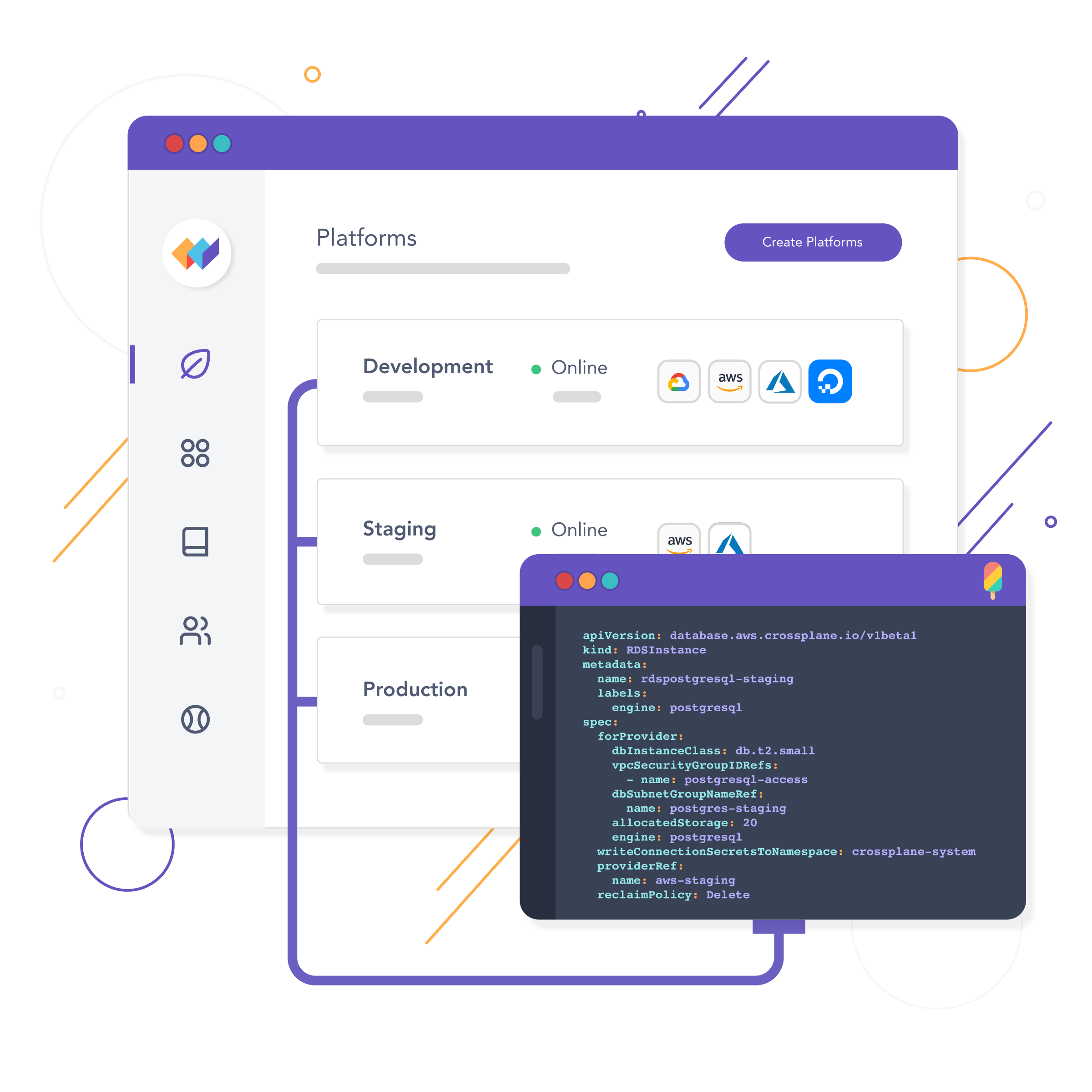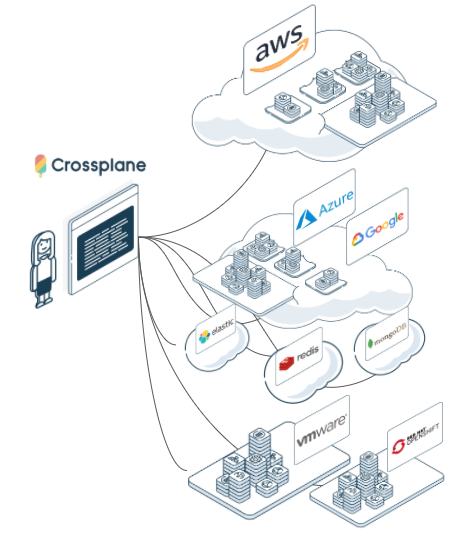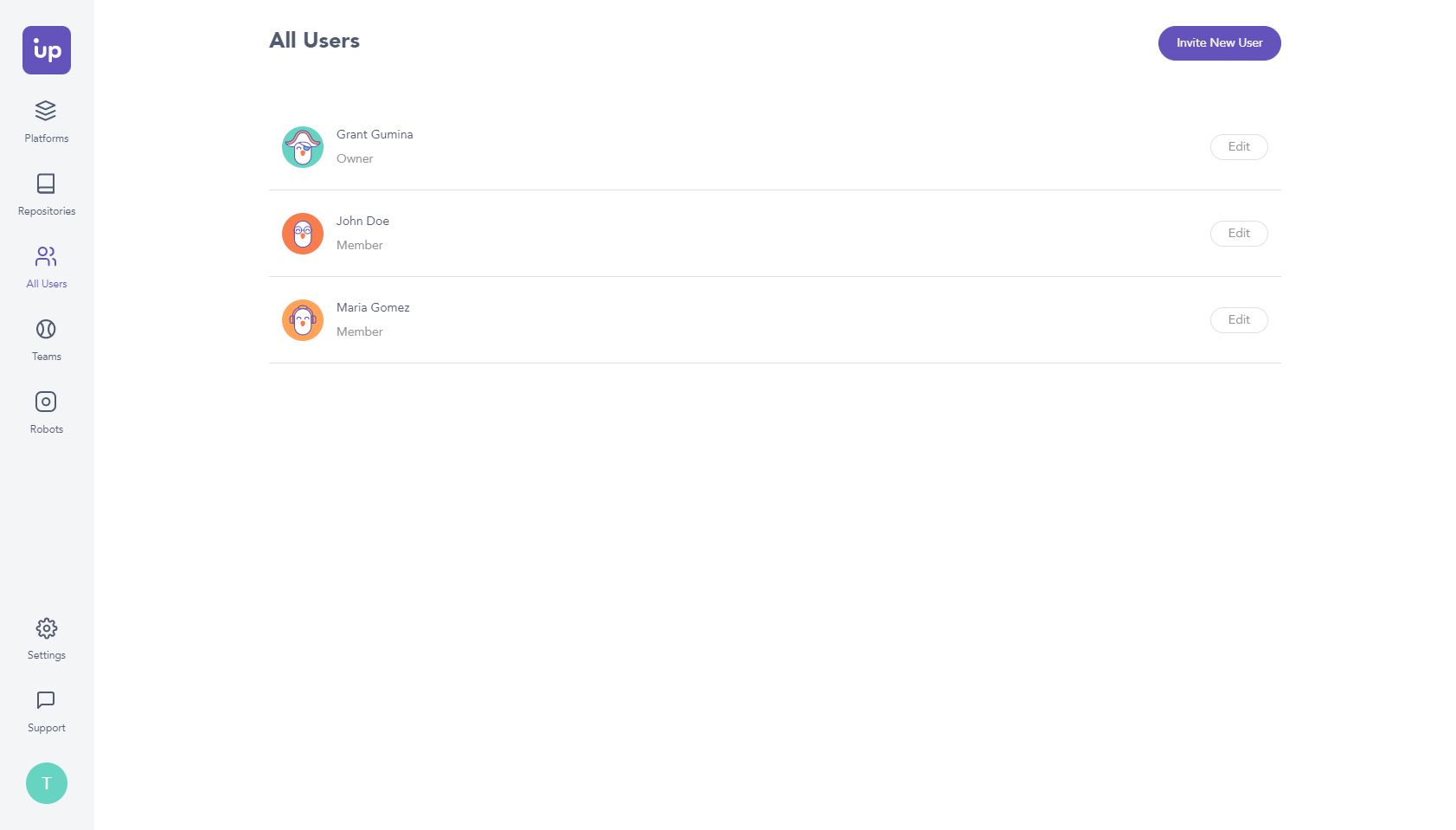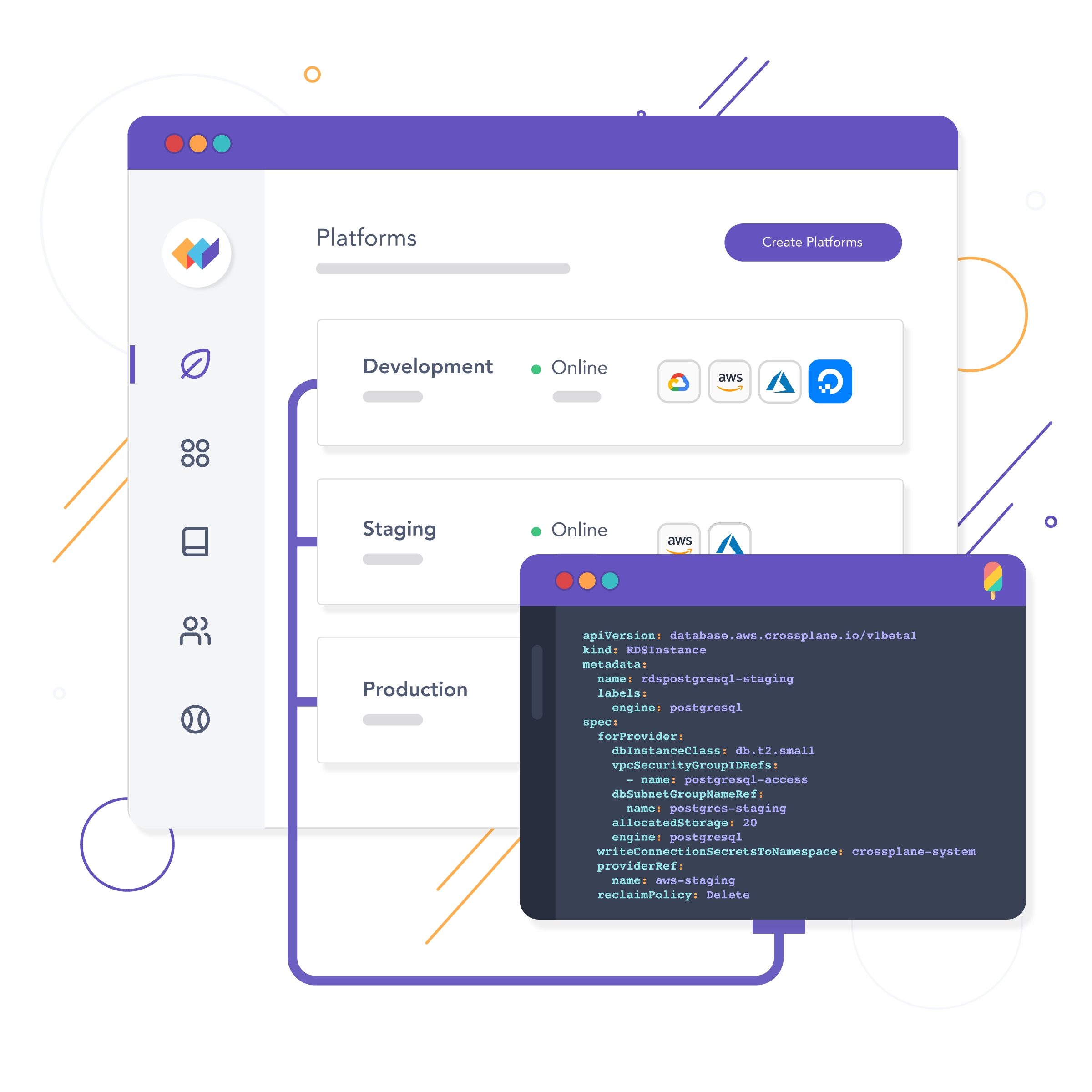Today we are excited to announce several major new features in Upbound Cloud which build upon what we’ve learned since launching in May 2020. This major release helps our customers eliminate infrastructure bottlenecks, build software faster, and avoid security pitfalls empowering users to accelerate and scale their Cloud Native journey.

What is Upbound Cloud?
Upbound Cloud is an enterprise grade, managed service of Crossplane. It lets companies define and deploy custom cloud consoles and APIs on top of existing infrastructure environments using our popular open source project, Crossplane. With Upbound Cloud, operators author an opinionated set of abstracted APIs to their platforms, hiding organizational policy guardrails and environment complexity behind a safe to use API.
On the other side of the API line, developers login and are greeted to a cloud console curated for them by operators and tailor-fit to their needs. When they provision infrastructure on-demand using the Upbound Cloud API or UI, that infrastructure automatically adheres to their organization’s policies and best practices.
Upbound Cloud is especially useful for organizations trying to deploy Kubernetes at scale and are trying to empower developers to self-service infrastructure or manage large deployments of Kubernetes across environments.
Sign up and try Upbound Cloud now. Continue reading to learn more about why we’re building Upbound Cloud, the problems it solves, and the features it has.
Your Universal Cloud API
We built Upbound Cloud to help enterprises scale Crossplane usage to production, empowering customers to define and deploy their own universal cloud API on top of existing infrastructure. The end result is a single point of control for operations teams and an amazing developer experience for applications teams who no longer have to submit tickets or become infrastructure experts to get the tools they need.

A key insight we’ve had while working with customers has been seeing companies attempt to operate like the cloud vendors do. Customers want a small team of SREs to manage and hide infrastructure complexity from much larger application teams who can provision resources on-demand.
Anyone who's worked for one of the big three cloud service providers, ourselves included, will tell you that while end users "see" clean interfaces, behind the scenes things are very different. Perl scripts, ticketing systems, and people driving forklifts in data centers are all hidden from users who interact with intuitive APIs and consoles. The secret is in what's sitting between users and the messy details of hyper-scale computing environments - it's what the cloud providers call a control plane.
Internally, these control planes go by different names. AWS calls theirs Coral. Google calls theirs Pantheon. Azure named theirs Arm. At Upbound, we decided to build a control plane for everyone, and are bringing it to the enterprise with Upbound Cloud.
As more cloud providers support Kubernetes style APIs for managing resources, the vision behind @crossplane_io moves closer to reality. https://t.co/5X2F2AleUh
— Kelsey Hightower (@kelseyhightower) August 20, 2020
Features
Upbound Cloud provides many features which helps users deploy and manage Crossplane in production.
Fully managed Crossplane - Upbound Cloud makes running at-scale deployments safe and easy. Upbound Cloud will manage your control planes and take care of all the difficult backups, load balancing, and auto-scaling for you.
Self-service consoles - When your application teams login to Upbound Cloud, they can browse and provision infrastructure from your cloud APIs through our User Console. When administrators login, they’ll use our Admin Console to manage your APIs and monitor which resources teams are using.

Users and teams - Everyone on your team has a home in Upbound Cloud. Permissions for both users and teams are easily managed and automatically synced with the underlying Kubernetes RBAC policy in your Crossplane clusters.

Robots - CI/CD can be used with Upbound Cloud to deploy private Registry listings, manage infrastructure, and curate cloud consoles for teams thanks to our Robot Accounts feature. Robots act as virtual team members and provide pipelines with an entry point into Upbound Cloud.
Registry Integration - Upbound Registry is the community library for Crossplane where users can find blueprints for the cloud APIs they’re building. Upbound Cloud makes it easy for your team members to view and install your organization’s private listings you've uploaded.

Use Cases
Cloud Agnostic Cluster Configuration and Deployment
With Upbound Cloud, operators define cluster configuration as code using our open source Crossplane project. You will upload this configuration to Upbound Cloud where it gets instantiated, and provide application teams access to these clusters. Details like network setup, which service mesh needs to be installed by default, how it should be configured, and RBAC can all be defined once in a repository of YAML. Each time a new cluster is created from Upbound Cloud’s API or console UI, it automatically adheres to this configuration.
Upbound Cloud continuously reconciles your configuration with resource state, eliminating any possibility of configuration drift and ensuring applications run reliably. Backups, node upgrades, and scaling clusters can be done to all clusters at once with a simple git push command to your configuration repository.
Self-Service Developer Environments
For many developers, getting the infrastructure they need takes too long and is overly complicated. Infrastructure operators can spend weeks collecting and negotiating requirements with app teams, defining and capturing configuration as code, and deploying the new infrastructure across all necessary environments. Upbound Cloud makes TicketOps a thing of the past by providing developers with self service cloud consoles where any infrastructure they provision automatically adheres to the policies, permissions, and quotas their organizations have.
Securely Connecting Apps to Infrastructure
At the heart of Upbound Cloud is the ability for operators to define custom cloud APIs and consoles on top of their existing infrastructure. Operators encapsulate all their organization’s policies and permissions behind these APIs so application teams can safely self service infrastructure which automatically adheres to guardrails put in place. When developers use the APIs created with Upbound Cloud from their Kubernetes applications, Upbound Cloud securely passes through the infrastructure credentials to applications. Developers don’t have to hardcode in secrets, and pipelines no longer have to inject them during deployment. Infrastructure secrets can be accessed by anyone on the team who has permission, making it easy to safely collaborate on projects together.
Give It a Try Today
Sign up for our Community Preview today, and stop by our booth at KubeCon NA next week for a guaranteed good conversation and a chance to enter our green screen raffle 😀!
PS: Powering every Upbound Cloud account is the CNCF popular open source project, Crossplane. Crossplane is hosted on Github, and we have a thriving community on Slack and Twitter. Come join the fun!
Subscribe to the Upbound Newsletter
